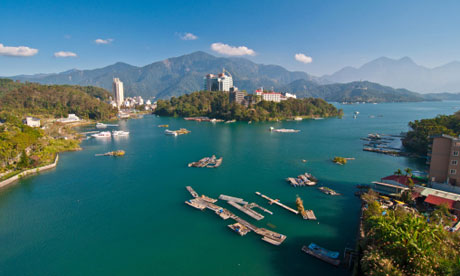
"Why Taiwan?" friends had asked. They were clearly imagining a giant and monstrously productive factory. Few knew much about Taiwan, or had heard of either its former name, Formosa ("beautiful" in Portuguese), or its official post-war name, the Republic of China (RoC).
Their vision was a far cry from my surroundings at Sun Moon Lake, an hour south of Taipei by rail. The train, complete with karaoke carriage, had travelled through dense forests and past towns that seemed to be made largely from shipping containers.
But at the lakeside, the stillness was gobsmacking. I sat on the terrace of the lovely Lalu Hotel and sipped tea from a porcelain cup that was topped up endlessly. The scent of lemongrass filled the air, and the reflections of huge mountains shape-shifted in the still water. Just visible on a hill was the golden roof of a temple that houses the remains of Xuanzang, a seventh-century monk whose travels round India inspired the classic Chinese novel Journey to the West.
High above it stands the Tsen pagoda, built on the orders of Chiang-Kai-shek, the nationalist politician who became China's nominal leader in 1926. After losing the civil war to the communists, he set up what he and the US thought would be a temporary haven in Taiwan in 1949. He called his state the Republic of China, and it held a UN seat in that name until 1971. Now Taiwan can't change its official name from RoC without provoking China, 75 miles away, which claims to own it. But it has nevertheless established the first democratic state in the Chinese-speaking world and is regarded as one of Asia's freest countries.
"This," laughed an i-Pad-wielding monk sitting beside me on the terrace, "is where Chiang dreamed of one day retaking mainland China."
Surprised to see a monk in a five-star hotel, I asked him what he was doing.
"I find the view meditative," he said.
He had a point. This place is so serene they don't even bother playing relaxing sounds in the spa. The gentle breeze carries the scent of osmanthus flowers. A huge open water swimming race is held here every September, but I had just missed it. I consoled myself with a few laps of the infinity pool, a water yoga session with teacher Rajesh Mishra, and having my third eye opened with an Ayurvedic massage.
The next day I joined Japanese and Chinese tourists on a boat trip around tiny Lalu island, sacred to the Thao tribe, the smallest ethnic group in Taiwan. Tribal peoples arrived in Taiwan from all over the world for thousands of years, although the origin of many of these aboriginal groups remains a mystery. According to Thao legend, a white deer led them to this promised land, which they call Pekan, or "haven gained after long wandering".

